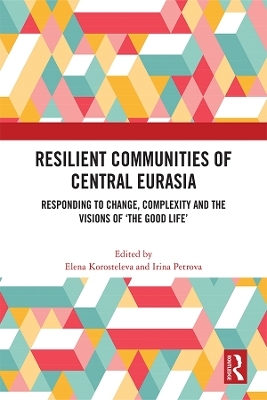
Resilient Communities of Central Eurasia
Routledge (Verlag)
978-1-032-29095-9 (ISBN)
This book argues for the need to rethink governance through the lens of 'resilience as self-governance'. Building on complexity-thinking, it contends that in the context of change and complex life, challenges are most efficiently dealt with, at the source, 'locally', to make 'the global' more responsive and sustainable.
Resilience as self-governance is advanced as an overriding framework to explore its constitutive elements - identity, ‘good life’, local coping strategies and support infrastructures - which, when mobilized, can turn communities into ‘peoplehood’ in the face of adversity. It is argued that these communities of relations, self-organised and self-aware of their worth, is what makes them so resilient to crises, and what helps them to transform with change; and how they should be governed today. Central Eurasia, spanning from Belarus in the west, to Azerbaijan in the south and Kyrgyzstan in the east, provides fertile grounds for exploring how resilience works in practice in times of complex change. By immersing into centuries-long traditions and philosophy, local experiences of survival, and visions for change, this book shows that governability at any level requires a substantive 'local' input to make 'the global' more enduring and resilient in a complex adaptive world.
This book will be of great value to students and scholars in the fields of Politics including Eurasian politics and the various aspects of Governance. Most of the chapters in this book were published as a special issue of Cambridge Review of International Affairs.
Elena Korosteleva is Professor of Politics and Global Sustainable Development, and Director of the Institute for Global Sustainable Development, at the University of Warwick. Elena is formerly Principal Investigator for GCRF-funded project COMPASS (ES/P010849/1, 2017-22) and Co-Founder/Investigator for the Oxford Belarus Observatory (2020-22), University of Oxford. Her interests include resilience, complexity-thinking, order formation and multi-order governance in Central Eurasia. Her recent publications are Belarus in XXI Century: Between Dictatorship and Democracy (with I. Petrova and A. Kudlenko, Routledge 2022, forthcoming), 'The War in Ukraine: Putin and the Multi-order World', Contemporary Security Policy, 43(3) 2022: 466-81 (with T. Flockhart); and Resilience in EU and International Institutions (with T. Flockhart, Routledge 2020). Irina Petrova is Assistant Professor in the Politics of Eurasia at the UCL School of Slavonic and East European Studies (SSEES). Her recent publications include 'Community Resilience in Belarus and the EU response' in Journal of Common Market Studies Annual Review, October 2021 (with E. Korosteleva); 'Societal fragilities and resilience: The emergence of peoplehood in Belarus' (with E. Korosteleva), August 2021 in the Journal of Eurasian Studies; and 'From "the global" to "the local": the future of cooperative orders in Central Eurasia in times of complexity' (with E. Korosteleva), International Politics 58(3) 2021.
Introduction: What makes communities resilient in times of complexity and change? 1. Decolonising resilience: reading Glissant’s Poetics of Relation in Central Eurasia 2. From ‘Westlessness’ to renewal of the liberal international order: whose vision for the ‘good life’ will matter? 3. Encountering the Complexity of Global Life 4. ‘Imitated’ or genuine? The value of resilience in Sufi-hamsoya 5. Communal self-governance as an alternative to neoliberal governance: proposing a post-development approach to EU resilience-building in Central Asia 6. Belarus between West and East: experience of social integration via inclusive resilience 7. The Azerbaijani resilient society: explaining the multifaceted aspects of people’s social solidarity 8. Community resilience and social capital in post-Soviet mono-industrial areas affected by the uranium legacy and radiation: evidence from Kyrgyzstan Conclusion Locating Central Eurasia’s inherent resilience
| Erscheinungsdatum | 11.09.2024 |
|---|---|
| Verlagsort | London |
| Sprache | englisch |
| Maße | 174 x 246 mm |
| Gewicht | 385 g |
| Themenwelt | Sozialwissenschaften ► Politik / Verwaltung ► Europäische / Internationale Politik |
| ISBN-10 | 1-032-29095-1 / 1032290951 |
| ISBN-13 | 978-1-032-29095-9 / 9781032290959 |
| Zustand | Neuware |
| Informationen gemäß Produktsicherheitsverordnung (GPSR) | |
| Haben Sie eine Frage zum Produkt? |
aus dem Bereich


